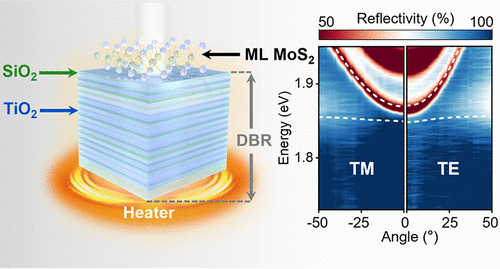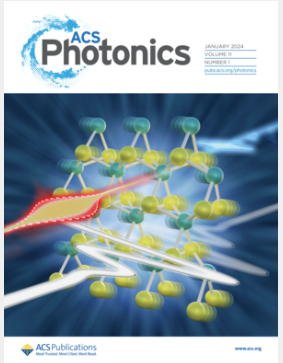Achieving Zero-Detuned and Polarized Bragg Polaritons in Monolayer MoS2 above Room Temperature
IF 6.7
1区 物理与天体物理
Q1 MATERIALS SCIENCE, MULTIDISCIPLINARY
引用次数: 0
Abstract
Monolayer transition metal dichalcogenides (TMDs), with their large exciton binding energies, are promising platforms for exploring exciton-polariton physics and developing integrated polaritonic devices that can operate at and above room temperature. Resonant exciton-photon coupling and polarized exciton-polaritons are highly desirable for on-chip applications, such as optical switches and logic gates. However, both achieving zero detuning, rather than the more accessible positive or negative detuning regimes, and realizing polarization-resolved light-matter interactions remain challenging at elevated temperatures. Here, we demonstrate zero-detuned and polarized Bragg polaritons at 333 K in a superacid-treated monolayer MoS2 integrated with a distributed Bragg reflector. By thermally tuning the system and splitting the intrinsic transverse electric and transverse magnetic modes, we generate polarized Bragg polaritons. Polarization-resolved and angle-dependent reflectivity spectra reveal a polarization-sensitive behavior between parallel and perpendicular directions. The coupled oscillator model confirms the existence of Bragg polaritons, with anisotropic effective masses and Hopfield coefficients. Polaritonic devices operating at elevated temperatures enhance thermal stability and alleviate self-heating effects, which are essential for sustaining performance under practical operating conditions. Our findings demonstrate the realization and control of polarization-tunable Bragg polaritons in monolayer TMDs under realistic thermal conditions, paving the way for polarization-sensitive polaritonic circuits in on-chip switches and logic gates.

在室温以上的单层二硫化钼中实现零失谐和极化的布拉格极化子
单层过渡金属二硫族化合物(TMDs)具有较大的激子结合能,是探索激子-极化子物理和开发可在室温及以上工作的集成极化子器件的良好平台。谐振激子-光子耦合和极化激子-极化子在片上应用非常理想,例如光开关和逻辑门。然而,实现零失谐,而不是更容易获得的正失谐或负失谐,以及实现偏振分辨的光-物质相互作用在高温下仍然具有挑战性。在这里,我们展示了在333k下,用分布式Bragg反射器集成的超酸处理单层MoS2中零失谐和极化的Bragg极化子。通过热调谐系统和分裂本征横向电模式和横向磁模式,我们产生极化布拉格极化子。偏振分辨和角度依赖的反射率光谱揭示了偏振敏感行为之间的平行和垂直方向。耦合振荡模型证实了Bragg极化子的存在,其有效质量和Hopfield系数具有各向异性。在高温下工作的极化器件提高了热稳定性,减轻了自热效应,这对于在实际操作条件下保持性能是必不可少的。我们的研究结果证明了在现实的热条件下,在单层tmd中实现和控制极化可调谐的布拉格极化,为片上开关和逻辑门中的极化敏感极化电路铺平了道路。
本文章由计算机程序翻译,如有差异,请以英文原文为准。
求助全文
约1分钟内获得全文
求助全文
来源期刊

ACS Photonics
NANOSCIENCE & NANOTECHNOLOGY-MATERIALS SCIENCE, MULTIDISCIPLINARY
CiteScore
11.90
自引率
5.70%
发文量
438
审稿时长
2.3 months
期刊介绍:
Published as soon as accepted and summarized in monthly issues, ACS Photonics will publish Research Articles, Letters, Perspectives, and Reviews, to encompass the full scope of published research in this field.
 求助内容:
求助内容: 应助结果提醒方式:
应助结果提醒方式:


